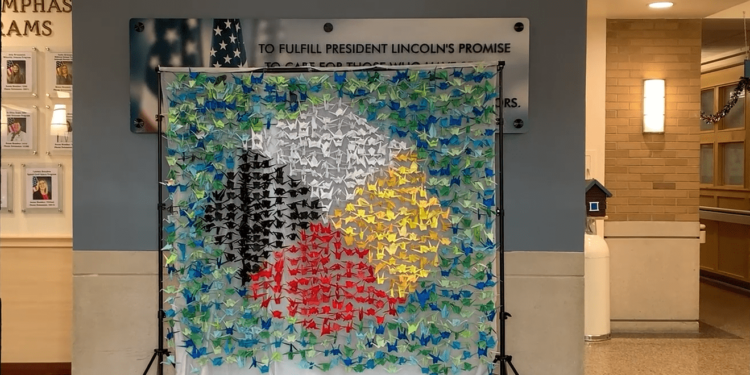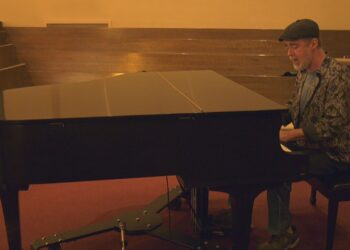IRON MOUNTAIN, Mich. (WZMQ) – In recognition of Native American Heritage Month, the Oscar G. Johnson VA Medical Center in Dickinson County is taking significant steps to show support for Native American Veterans, and raise awareness of cultural considerations. The centerpiece of their initiative is a stunning Origami Crane Medicine Wheel display that has been traveling to various reservations within the VA hospital’s catchment area. This symbolic exhibit signifies the importance of unity and wellness within Native American communities.
Sharon Anastas, the Suicide Prevention Program Manager at the VA, shared her excitement about the Medicine Wheel’s presence during the coming month of November. She emphasized the collaborative effort with Native American tribes, and the positive reception the exhibit received during its journey, including stops at Lac du Flambeau, Lac Vieux Desert, Sault Ste. Marie tribe, Hannahville, and Keweenaw Bay College.
“I think a lot of people may not be aware that we have services for our Native American veterans, and we’re continuing to grow those services,” shared Anastas.
The VA is using this occasion to kick off Native American Heritage Month by highlighting their partnership with Native American tribes through the Medicine Wheel display. The lobby of the hospital now features an informative table about the services provided for Native American veterans, a significant step in increasing awareness about the available resources.
Anastas underlines the importance of addressing high suicide rates in Native American communities, particularly among veterans. Native American veterans serve at the highest rate among any cultural group in the armed services and face unique challenges. Providing care and support is crucial, and the VA aims to be a beacon of hope.
“One of the things I’m really excited about in my line of work in being in the suicide prevention program manager is to be able to partner with the Native American special emphasis program manager, to get the message out about suicide rates in our Native American communities, which is really high. We know that Native American veterans are the highest serving of any culture in the armed services, and there are a lot of challenges that our Native American veterans face. Suicide, unfortunately, is one of them, and so getting the word out about the services we offer, really trying to advocate, and instill the hope that’s out there for getting care is important,” commented Anastas.
To further this cause, a cultural considerations presentation is scheduled for November 1, open to anyone interested. Gail Beauchamp, the Native American Program Manager, will lead this event, which has attracted participants from VA’s in Little Rock, Arkansas, Buffalo, New York, Boston, Massachusetts, as well as the National Office of Rural Health, and various community partners. Anyone is welcome to join in the cultural considerations presentation, which starts at 2:30 central time, November 1st. Those interested in participating can call the VA and speak with Beauchamp.
The VA is celebrating Native American Heritage Month at their canteen by offering a weekly special featuring Native American cuisine. This initiative includes dishes like Three Sisters Soup, Fry Bread, and a Strawberry Dessert, promoting Native American culture.
The Medicine Wheel display is accompanied by a poignant placard that emphasizes the importance of supporting each other, particularly in matters of mental health and suicide prevention. Origami cranes, folded by VA staff, veterans, and community members, carry personal messages of support for struggling veterans, echoing the tradition of using cranes to gather people for ceremonies and celebrations.
The medicine wheel, explanation placard for the origami crane display reads:
“Good relatives all keep each other healthy and safe. That includes talking about mental health and suicide, and getting support when needed. We all have a part to play in helping to prevent suicides.
These origami crane’s have been folded by Oscar G. Johnson Cell VA staff, veterans and community members along with some personal notes written inside as a show of support for our veterans that may be struggling. You are not alone.
It is said that crane is also known as echomaker, because they would sound their voices to gather the people for ceremony, council, and celebrations. It is hoped that our crane medicine wheel, and the information provided, will also gather people. This is the time to care for one another, spiritually, emotionally, physically, and mentally as good relatives do, and to remember that we are all here for a reason.”
The Medicine Wheel, together with this message, serves as a reminder that we all play a part in helping to prevent suicides and caring for one another in every aspect of life. Veterans who may be in need of support are urged not to wait, and are urged to reach out to the new veteran crisis line: 988, then press 1.










